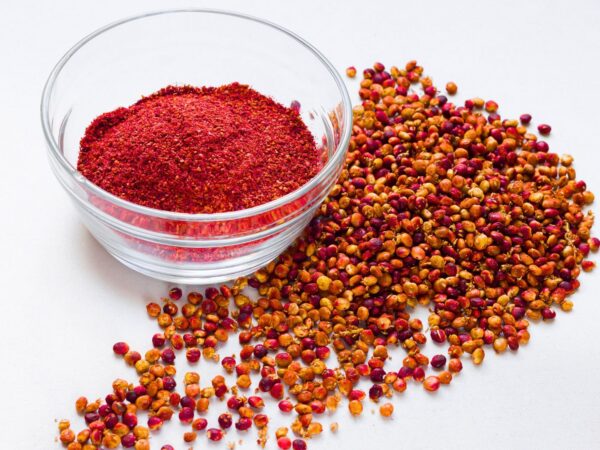Sumac, Syria
Syrian Sumac, a vibrant and tangy spice, hails from the fertile lands of the Middle East, where it has been a culinary staple for centuries. This unique spice, derived from the dried and ground berries of the Rhus coriaria shrub, offers a distinctive lemony zest that can elevate a variety of dishes.
Origins and Characteristics
Sumac has its roots in the ancient Levantine region of Syria, where it has been cherished not only for its flavor but also for its medicinal properties. The Rhus coriaria shrub thrives in the Mediterranean climate, producing deep red berries that are harvested, dried, and finely ground into a coarse, ruby-hued powder. This process preserves the spice’s natural tangy and slightly astringent flavor.
Often associated with the poison Sumac tree, this spice is a completely different variety. This spice creates authentic middle-eastern flavors.
Flavor Profile
The flavor of this red berry spice is often described as tart, tangy, and slightly sweet with a subtle hint of bitterness. It is a pleasant mix of sour, sweet, salty and bitter. Its bright acidity is reminiscent of fresh lemon juice, but with a deeper, more complex undertone that adds a unique layer to dishes. This balance of flavors makes it a perfect substitute for lemon or vinegar in recipes, providing a milder and more nuanced acidity.

Culinary Uses
Before the Romans learned of the lemon, they often used sumac due to its sour and astringent properties. Now you can find this spice on vegetables, chicken, lamb, or as an additional seasoning on hummus. It is especially popular as dry rub on grilled foods. You will also find it on or in the popular middle-eastern dish of Fattoush salad. This spice is also an essential component of the spice blend Za’atar, which is used to season flatbreads, dips, and marinades.
Popular Dishes Featuring Sumac
- Fattoush: A traditional Levantine salad made with mixed greens, fresh vegetables, toasted pita bread, and a generous sprinkle of Sumac, giving it a zesty finish.
- Musakhan: A Palestinian dish featuring roasted chicken seasoned with Sumac, onions, and pine nuts, served on a bed of flatbread.
- Sumac-Dusted Grilled Vegetables: A simple yet flavorful preparation where grilled vegetables are seasoned with olive oil and Sumac, enhancing their natural sweetness.
- Sumac Onions: Sliced onions mixed with Sumac, salt, and a touch of olive oil, often used as a condiment for kebabs and sandwiches.
Health Benefits
Sumac boasts a range of health benefits. It is rich in antioxidants, which help combat inflammation and protect the body against oxidative stress. It also has antimicrobial properties, aiding in the prevention of infections. Additionally, it is known to support digestive health, helping to alleviate stomach issues and improve overall gut function. The spice is also low in calories and fat, making it a healthy addition to any diet. For more information about its health benefits, check out this post: The Power of Sumac Berry
Spice Station: Your Destination for Sumac and More
At Spice Station, we are proud to offer authentic Sumac from Syria. Our spice is meticulously processed to retain its vibrant color and potent flavor, ensuring that you receive the highest quality spice.
But our offerings don’t stop there. Spice Station is your one-stop-shop for a wide variety of regional spices that bring the world’s flavors to your kitchen. From exotic blends like Ras el Hanout and Garam Masala, to single spices like Aleppo Pepper and Cardamom, we provide a curated selection that caters to both professional chefs and home cooks.
The spices and spice blends in our collection are chosen for their authenticity, quality, and ability to transform everyday meals into extraordinary culinary experiences. Whether you’re looking to explore new flavors or recreate beloved traditional dishes, our Spice Station Shop has the spices you need to make it happen.
Reviews
There are no reviews yet.